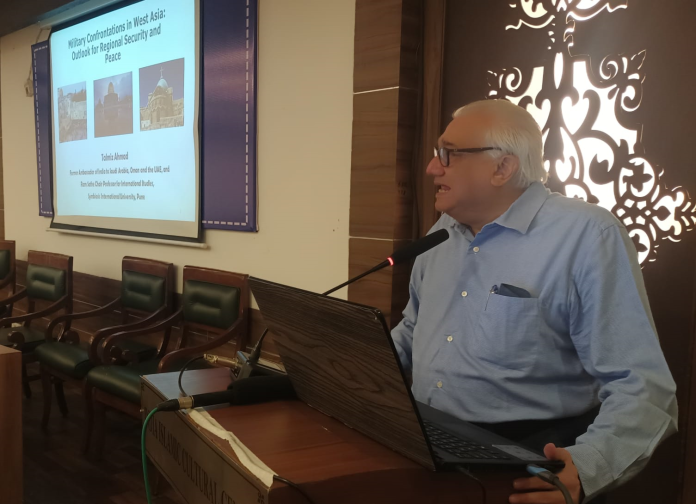During the inaugural lecture of IICC Dialogues titled “Outlook for West Asia – Looking Ahead,” hosted by India Islamic Cultural Centre, Talmiz Ahmad, former Ambassador to Saudi Arabia, Oman, and UAE, delved into the complexities of Israel’s genocidal attacks on Gaza, examining the roles of the United States, the broader Muslim world, and the ongoing impact on Palestinians.
Ahmad, the author of West Asia at War, argued that Gaza has endured prolonged Israeli aggression over several decades, with violence predominantly initiated by Israel. He noted that the October 7 attack by Hamas marked the first significant military initiative from the Palestinian side, shocking Israelis as it resulted in the deaths of 300-400 Israeli soldiers, an aspect often overshadowed by accusations of mistreatment of women.
Ahmad emphasised that understanding the ongoing genocide in Gaza requires an examination of the Zionist movement’s messianic origins, which have shaped Israeli political and religious beliefs since its establishment in 1948. Central to this ideology are three concepts: Jews as God’s chosen people, their divine entitlement to the land of Israel, and the notion that this land is exclusively for Jewish use, often resulting in the harsh treatment of Palestinians through extermination, exile, or enslavement, as interpreted from the Old Testament.
Recalling peace efforts like the Oslo Accords of the 1990s, Ahmad highlighted the mutual recognition between the Palestine Liberation Organization (PLO) and Israel, with the PLO acknowledging Israel’s existence within its 1967 borders. However, crucial issues like the establishment of a sovereign Palestinian state, East Jerusalem as its capital, and the return of displaced Palestinian refugees were deferred for future negotiations. Attempts to resolve these at Camp David II in 2000, mediated by President Clinton, failed due to domestic political pressures faced by then Israeli Prime Minister Ehud Barak.
Ahmad identified Prime Minister Benjamin Netanyahu as a dominant figure in Israeli politics for decades. He credited Netanyahu with securing strong US support for Israel’s hardline policies and diverting American focus from the Palestinian issue to Iran as the main regional threat. Ahmad argued that the Biden administration’s continued military aid to Israel and its reluctance to push for a ceasefire contributed significantly to the ongoing devastation in Gaza.
Referring to Bob Woodward’s new book “War,” Ahmad pointed out that contrary to claims, Hamas did not reject ceasefire talks outright. Instead, they proposed releasing hostages in exchange for an Israeli military withdrawal from Gaza, a condition unacceptable to Israel, stalling ceasefire efforts.
Regarding the International Court of Justice, Ahmad noted two key judgments: labelling Israeli actions as potentially genocidal, given the historical context of Jewish suffering during the Holocaust, and calling for an immediate Israeli withdrawal from occupied territories.
Woodward’s book also quotes President Biden telling Netanyahu that Hamas is more than just an organisation; it is an idea that cannot be eradicated merely by killing its leaders. Ahmad concluded that while the targeted killing of leaders like those from Hamas and Hezbollah might temporarily boost Israeli morale, it does not address the underlying issues. He criticised the lack of international leadership willing to confront the ongoing violence, urging an end to what he termed “meaningless mass-murder.”




